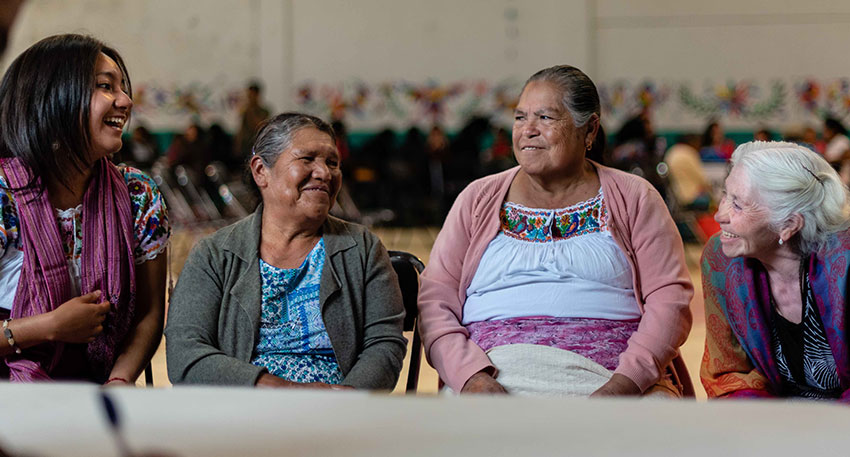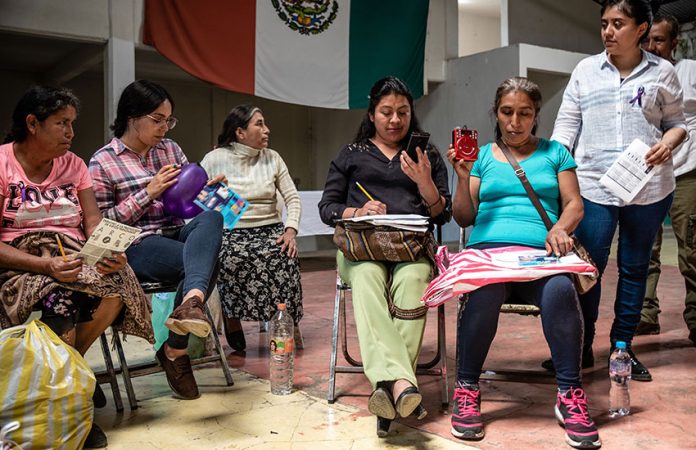On March 8 80,000 people took to the streets of Mexico City in honor of International Women’s Day. While there was an electric sense of solidarity in the air this wasn’t a march of celebration, but of protest.
Mexico is one of the most dangerous countries in the world to be a woman. Officially 1,010 women died from gender-related violence in 2019, but most activists believe that number doesn’t even come close to the reality. The country’s seeming inability to protect its female citizens is why so many women (and men) took to the streets – protesting the impunity enjoyed by attackers, and the impotence of the Mexican government.
But among women in Mexico, indigenous are even further marginalized and vulnerable. The combined factors of geography, low levels of education, poor health services, and language barriers (many speak one of Mexico’s 68 indigenous tongues as their primary language) have made these women the targets of violence, isolation, and neglect.
But their situation is not indicative of their abilities which, along with the right tools, could change their reality and that of their communities.
One organization, Psicología y Derechos Humanos (Psychology and Human Rights), Psydeh for short, is trying to give women the very tools they need for autonomy, security, and self-reliance.
This small but mighty organization, founded by four women in Tulancingo, Hidalgo, a state whose population is almost 40% indigenous, is working to organize women in one of the three majority-indigenous regions – the Sierra Otomí-Tepehua. Ninety-five percent of the indigenous women surveyed in the region report violence in schools and the home. Eighty-six percent of the population live at or below Mexico’s poverty line (US $72 or less a month), and the average education level for women in the region is third grade.
Psydeh’s hope is to create bottom-up solutions for the problems these marginalized women face. For many years the organization carried out annual one-off projects with yearly funding from the Mexican government. But they soon realized that this kind of stop-and-start development wasn’t leading to long-term sustainability. So they shifted their approach, recrafting their work from single-project outputs to long-term grassroots development.
“We created this multi-year program, which is really built around the idea of how bottom-up organizing can be facilitated,” says Damon Taylor, who started working with the organization in 2013. “It’s a process-oriented model, that involves steps. It’s not chronological, it’s process. Over the last five years we have built a foundation around which we think we can be doing bottom-up citizen-led development in marginalized communities.”
Psydeh’s initial approach to any community is through education. It offers workshops led by female facilitators (that speak the local language) covering a wide variety of issues – voter rights, gender violence, data privacy – and invite local women to participate. Women attend for all different reasons.
“Some are just interested in learning something new, some have never been asked to participate in anything before. Others think ‘maybe this is how I’m going to get some money, or maybe this is how I’m going to get some food,’ and so they show up,” says Taylor.
Women slip into the workshops and listen. Some leave without a word, some linger hoping to hear about an economic opportunity, and some are called to action, like Lucía.

Lucía comes from an indigenous community of 100 families in the municipality of San Bartolo Tutotepec. She has a high-school level education and her principal language is Otomí. Over a period of two years she attended Psydeh workshops in her town until she and some other women decided to organize themselves formally into a community group, or council, as Psydeh calls it. The organization helped them throughout the process.
As this small group of women started to brainstorm about common problems and how they, through collective action, might be able to solve them for themselves, Psydeh helped them find and apply for micro-project funding offered by the government and other third-party funders.
They also trained the women in governance, proposal writing, organizational capacity, and telling their story in text and visual form. Throughout, Psydeh remained in the background, assisting when they were asked, letting the women take the lead.
“Our objective, at the end of the day, is to leave. We don’t want to be there for 50 years. We want to have incubated a movement, an organized group of people who can solve their own problems, independent of an intermediary who is making money off these people vis-à-vis the government or other people,” says Taylor.
Today the women of Lucía’s group have a legal constitution, an organizational logo and mission and vision statements and are applying for their own funding. They recently applied for money for gender-violence education in their community. Other projects from other groups have included more day-to-day necessities like rainwater catchment systems (with training on how to build and maintain them) and funding to buy livestock.
Five local councils have now been organized through collaboration with Psydeh and each works independently – developing projects, writing proposals and implementing solutions in their communities.
Psydeh also facilitates regional conferences where women from communities across the four municipalities in which it operates can meet, trade ideas, organize and experience each other’s cultures through dance, craft and art. These conferences have produced a regional agenda, developed by the women themselves, that laid out their own priorities for their communities and local development. That agenda was recently presented to Mexico’s president when he visited to discuss national policy on indigenous communities.
Psydeh is probably not an organization you have heard of. Along with thousands of small non-profits it is often overshadowed in an NGO world dominated by a few big names and foundations. For a small organization like this one, the funding game is not an easy one. While the work they are doing is powerful, their impact is hyper-local and their network limited.
When Taylor came aboard in 2013 they decided to get out from under the cycle of government funding (that ebbs and flows with each administration) and try to find a path to financial autonomy.
Enter crowdfunding. While only a part of the organization’s income stream, crowdfunding has allowed them to create a funding base that makes possible the telling of their story to other, larger funders and to everyday donors.
A worldwide phenomenon for funding personal projects, Globalgiving is the world’s best-known platform for non-profit crowdfunding. Organizations can sign up for campaigns on this platform and then use their networks to reach out for support. Even here access to funding might be equal but it’s not always equitable, with big name organizations far outreaching small local ones due to their large extended networks and marketing muscle.
Yet despite the odds, Psydeh has made progress in independently funding their organization. The money that comes from crowdfunding is more flexible and provides clear financial transparency to donors. This more intimate, personal way of giving has strengthened their networks and given them the opportunity to speak directly to the public about their work.
In an increasingly uncertain world, and within a country where women’s lives are not only difficult but threatened by violence and neglect, Psydeh is reaching out to the most marginalized, helping them help themselves. Important work, during International Women’s month and every day of the year.
Lydia Carey is a frequent contributor to Mexico News Daily. She lives in Mexico City.
